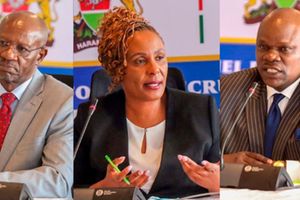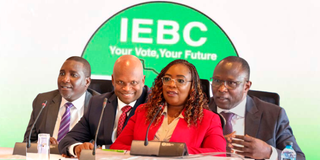
IEBC chairperson candidates (from left) Jacob Ngwele Muvengei, Francis Kakai Kissinger, Joy Brenda Masinde Mdivo and Erastus Edung Ethekon before the selection panel at the Edge Convention Centre, Nairobi City County on Tuesday, March 25, 2025.
The interviews for the 11 candidates shortlisted for the position of chairperson of the Independent Electoral and Boundaries Commission (IEBC) concluded on Wednesday, with key questions cutting across all candidates.
The nine-member selection panel, led by Nelson Makanda, put the candidates to task with tough questions on delivering fair, credible, and transparent elections.
Securing the credibility of the IEBC and ensuring the commission’s independence from political interference were dominant themes, with candidates asked how they would resist influence from powerful political figures.
The main issues that emerged during the interviews included safeguarding the commission’s credibility, voter apathy, reaching marginalized groups, ensuring transparency, the risks associated with IEBC jobs, vote transmission, and restoring public trust in the commission.
Three female candidates were shortlisted: former Chief Registrar of the Judiciary Anne Atieno Amadi, Joy Brenda Masinde-Mdivo, and Lillian Wanjiku Manegene.
Male candidates included Abdulqadir Lorot Ramadhan, former East African Court of Justice Judge Charles Ayako Nyachae, Edward Katama Ngeywa, Erastus Ethekon, Francis Kakai Kissinger, Jacob Ngwele Muvengei, Robert Akumu Asembo, and Saul Simiyu Wasilwa.
With the interviews now complete, the Dr Makanda-led panel will present two names of qualified candidates to the President, who will pick one for appointment as chairperson.
Of the 111 individuals currently being interviewed for the positions of IEBC commissioners, the panel will select nine names, from which the President will appoint six.
Political interference
Mr Nyachae and Ms Mdivo were questioned about their perceived closeness to President William Ruto. Both defended themselves, stating that if given the opportunity, they would conduct credible elections without external influence.
Ms Mdivo had previously chaired the United Democratic Alliance (UDA) grassroots elections, while Mr Nyachae held a position at the East African Court of Justice.
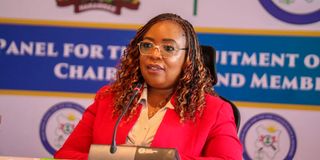
Joy Brenda Masinde Mdivo, a candidate for the Independent Electoral and Boundaries Commission (IEBC) chairperson position.
In his defence, Mr Nyachae said he secured the court job based on merit, not political affiliation.
“Every Kenyan, at some point, probably has some kind of political affiliation. My mind is very clear that, notwithstanding any political affiliation I may have had in public life, if I got this opportunity and accepted the job, I would only be guided by the Constitution of Kenya and the laws,” he said.
Addressing potential pressure, Mr Nyachae insisted he would remain steadfast.
“I’m not applying for this job thinking it’s going to be a bed of roses. Pressure will not be a reason for me to quit.”

East African Court of Justice judge Charles Nyachae, former Chief Registrar of the Judiciary Anne Atieno Amadi, the current Chief Magistrate in Naivasha Law Courts Abdulqadir Lorot Ramadan, and Edward Katama Ngeywa.
Voter apathy
On the issue of declining voter turnout in previous elections, the selection panel asked the candidates how they would address the problem.
Kenya recorded its highest voter turnout in 2013, 86 per cent, and 78 per cent in 2017, 70 per cent in 2007 when President Mwai Kibaki was seeking re-election, and 68 per cent and 70 per cent in 1997 and 1992 elections, respectively, when President Daniel Moi was seeking a fresh term in office. The 2022 election voter turnout was 65 per cent.
The 2010 referendum, when Kenyans gave themselves the current Constitution, recorded a 72 per cent voter turnout.
Former Turkana County Attorney Erastus Ethekon and former Nairobi County Assembly Clerk Jacob Ngwele Muvengei highlighted voter apathy as a major challenge the reconstituted commission would need to tackle.
"I propose initiating a national dialogue to engage all stakeholders and gather crucial feedback. This will allow us to effectively address voter apathy and ensure that the electoral process is both transparent and inclusive," Mr Ngwele said.
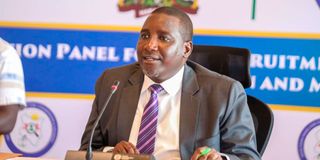
Jacob Ngwele Muvengei, a candidate for the Independent Electoral and Boundaries Commission (IEBC) chairperson position.
Ms Mdivo noted that transparency builds trust among Kenyans, which could be enhanced through digital transmission of results and real-time updates.
"If approved, I will prioritize investing in human capital to ensure staff are adequately trained. Additionally, there is a need to adopt advanced technology to facilitate seamless and efficient transmission of election results," she said.
Electoral violence
Candidates also shared their plans to curb violence during elections.
Mr Ethekon suggested that proper enforcement of the Election Offences Act could significantly reduce violence.
“When you look at the Election Offences Act—are the penalties adequate? We need to examine whether the penalties match the severity of offences committed during elections,” he said.
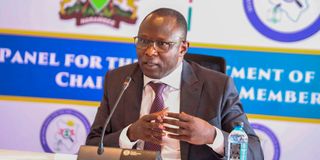
Erastus Edung Ethekon, a candidate for the Independent Electoral and Boundaries Commission (IEBC) chairperson position.
He added that maintaining fairness and transparency in voter registration and result transmission would help prevent violence.
The panel noted that repeated post-election violence has eroded public trust in the IEBC, and that the next commission must address this issue.
Also Read: Pick IEBC commissioners the public can trust
Ms Mdivo said Kenyans’ perception of presidential results needs to change to reduce post-election tensions.
“Already, Kenyans imagine that with politicians being part of the electoral process, something must be going on. After every election, you see a press statement claiming it was stolen. The default reaction is suspicion and conflict,” she said.

From bottom left: Abdihafid Abdullahi Yarow, Abduba Mollu Ido, Abdihakim Adan Abdi , Abdinur Maalim Hussein (top, right), Abraham Kipruto Langat and Adhan Nuri Berhe.
The danger of IEBC jobs
The panel also discussed the risks faced by IEBC officials, citing cases of intimidation and victimization.
Mr Ethekon revealed that some friends discouraged him from applying, comparing the move to “digging his own grave.”
“There are those who said, ‘You have what it takes, go for it.’ Then others said, ‘No, you’re going there to die; they’re going to beat you.’ All negativity,” he said, adding that the Constitution mandates such roles be held by Kenyans.
He said that engagement with all stakeholders and promoting tolerance could mitigate these risks.
“For me, as the chair, we will begin to work with electoral stakeholders. The political elites are the problem. We have to talk to this group and say: You can win, but you must also be prepared to lose.”
Mr Nyachae echoed this, stating it took courage to apply for the job despite discouragement from friends.
Power wrangles
Past IEBC conflicts between the chairperson and the CEO over decision-making authority also came up.
Abdulqadir Lorot emphasized the need for clearly defined roles and cooperation.
“The face of the commission is represented by the chair and commissioners. But the institution functions through the secretariat, which provides support services. One of my first priorities would be to ensure roles are clearly defined and that we follow the Supreme Court’s recommendations on corporate governance,” Mr Lorot said.



